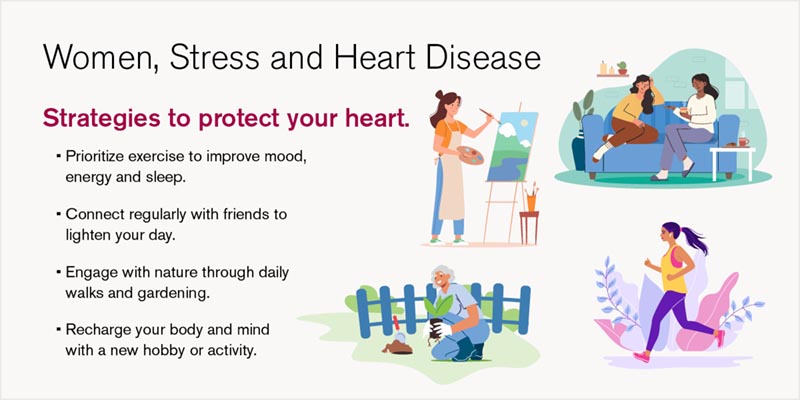Debunking Six Common Myths about Women's Heart Health
October 20, 2024
Categories: Women's Health, Heart & Vascular

By May Bakir, MD, cardiology and director, women's heart health program
Despite an increase in awareness over the past decade, only about half of women recognize that heart disease is their number one killer.
The good news is 80% of heart disease can be prevented through lifestyle changes. Here are some helpful facts, myths and risk factors you should know in order to prevent and beat heart disease.
Know the facts about cardiovascular disease and women
- Cardiovascular disease, which includes heart attack and stroke, claims the life of one woman about every 80 seconds.
- Two out of every three women have at least one traditional risk factor for heart disease.
- Cardiovascular disease is linked to one in every three female deaths, making it the number one killer of women in the U.S.
Common myths about heart disease in women
1. Heart disease is a man's disease
The fact is, every year more women die of coronary artery disease than men and fewer women will survive a first heart attack. Women not only experience higher mortality rates when compared to men, they also have poorer outcomes.
Women are less likely to be treated for heart disease, they are less likely to be prescribed guideline-directed medical therapy and be treated in a timely fashion - when compared to men.
Even when it comes to medication, women are less likely to receive statins for high cholesterol or anticoagulation (blood thinners) in atrial fibrillation to prevent stroke.
2. Women should worry about breast cancer, not heart disease
Heart disease, not breast cancer, is the #1 killer of women: 1 in 3 women will develop heart disease at some point in their lifetime compared with 1 in 8 who will get breast cancer.
As a woman, it is important to be as good at screening for heart disease as breast cancer.
3. Heart disease only affects older people
Heart disease affects women of all ages. For younger women, the combination of birth control pills and smoking increases heart disease risks by 20%, and pregnancy-related complications can cause heart failure.
Heart health issues can start as early as birth. You can be born with an underlying heart condition, such as premature narrowing of the heart's arteries (atherosclerosis) or familial hypercholesterolemia, a disorder passed down in families that causes dangerously high levels of LDL or "bad" cholesterol.
4. Fit and athletic women do not have heart disease
You can be thin and fit and have high cholesterol. Blood pressure and cholesterol should be checked starting at age 20, if not earlier for those that have a family history of certain heart disease.
5. I feel fine and therefore can’t have heart disease
Heart disease is silent, and 64% of females who have sudden cardiac death had no previous heart symptoms.
6. I already have heart disease and therefore there is nothing I can do
High blood pressure, high cholesterol, being overweight or smoking, are all modifiable risk factors. Every woman can take steps to reduce heart disease risk, for example, by giving up smoking, maintaining a healthy weight, finding ways to be more active and fit and eating more fruit, leafy greens, vegetables and fish.

Heart disease risk factors that affect both women and men
- Smoking
- High blood pressure, cholesterol or diabetes
- Not exercising or sitting for long periods of time
- Eating a diet high in salt, saturated fats, cholesterol and added sugars
- Being overweight or obese
- Family history of early heart disease
- Older age
- Stress
Heart disease risk factors unique to women
- Age of menstruating (before 10 or after 17 years of age)
- Menopause
- Pregnancy-related conditions:
- Gestational diabetes
- Gestational hypertension or preeclampsia
- Polycystic ovarian syndrome (PCOS)
- Postpartum heart failure
- Preterm delivery (before 37 weeks of gestation)
Conditions related to heart disease that are more common in women
- Microvascular heart disease: A disease that affects the smaller arteries supplying the heart muscle, which account for 60% of the blood supply to the heart.
- Spontaneous coronary artery dissection (SCAD)
- Autoimmune diseases, such as lupus (SLE) or rheumatoid arthritis (RA)
- Stress induced heart failure (also known as broken heart syndrome or Takotsubo Syndrome)
- Breast cancer: chemotherapy and radiation can cause heart disease during treatment, immediately after or years later.
Women’s heart health is unique, and heart disease may present very differently than for men. Different symptoms, health issues and treatments can impact women’s cardiac health, such as pregnancy and hormone replacement.
The Loyola women’s heart health program provides a multidisciplinary team of specialists adept at identifying and treating the symptoms and risk factors associated with heart disease in women.
May Bakir, MD, is a cardiologist and director of the women's heart health program at Loyola Medicine. Her continued research and passion is focused on heart disease in women, cardiovascular disease prevention, coronary physiology/pathophysiology and advanced cardiac imaging, as well as alternative and complementary medical approaches to heart disease.
Her clinical interests include, but are not limited to, heart disease, chest pain, heart attack, heart failure, hypercholesterolemia, hyperlipidemia, hypertension, heart disease of pregnancy and imaging including echocardiography, nuclear medicine, cardiac CT and cardiac MRI.
Dr. Bakir earned her medical degree at Ross University School of Medicine, West Indies. She completed a residency in internal medicine at Advocate Lutheran General Hospital and fellowships in cardiovascular disease at Cedars-Sinai Medical Center and Icahn School of Medicine at Mount Sinai.
Book an appointment today to see Dr. Bakir by self-scheduling an in-person or virtual appointment using myLoyola.
